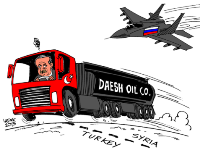The Failed Turkish Coup: implication for Ukraine
![]()
 During the weekend of 15-17 July, 2016 a faction of Turkey’s military attempted to take over the country. Chaos followed during the night of the coup, where 294 people, mostly civilians, were killed. In addition, over 6,000 people were arrested. As a result, world leaders are fearful that Turkish President Recep Tayyip Erdogan will use these attacks in order to further strengthen his rule. In other words, it is possible that these events could lead to a more oppressed Turkey. But what happened during the coup? And what sorts of influence does the failed coup attempt have on the rest of the world? The Geostrategy tries to provide an answers to those issues.
During the weekend of 15-17 July, 2016 a faction of Turkey’s military attempted to take over the country. Chaos followed during the night of the coup, where 294 people, mostly civilians, were killed. In addition, over 6,000 people were arrested. As a result, world leaders are fearful that Turkish President Recep Tayyip Erdogan will use these attacks in order to further strengthen his rule. In other words, it is possible that these events could lead to a more oppressed Turkey. But what happened during the coup? And what sorts of influence does the failed coup attempt have on the rest of the world? The Geostrategy tries to provide an answers to those issues.
On Friday 16 July, a faction of Turkey’s military attempted to seize control of the government. The coup attempt was originally scheduled for Saturday, but when it was reported that President Erdogan was away on vacation, the coup was implemented day earlier. During these events, hundreds of people were killed and thousands were arrested. Yet it was not necessarily the other members of the armed forces or the police that foiled the plot. Rather, it was the use of technology, something that has been oppressed in Turkey in the past. As the events unfolded during the night, President Erdogan used Facetime (a video steaming application on iPhone devices) as a means of reassuring the people that he was still in charge of the country, and urged Turkish citizens to help stop the coup attempt. Furthermore, many citizens took to Facebook in order to protest the coup attempt.
The attempt sent shock waves throughout the world, as Turkey plays a large role in national security. For example, it is the hub for refugees fleeing from Northern Africa and the Middle East when arriving to Europe. Moreover, Turkey has played a large role in the fight against ISIS (or ISIL). Had the coup been successful, this would have further destabilized the region. And finally, Turkey is a member of NATO. Had the coup been successful, it is possible this would have weakened NATO’s position in the Middle East and its strategy to combat terrorism. This is further supported by the fact that the US has many weapons stockpiled in Turkey, and had they fallen into the wrong hands, this surely would have further complicated matters.
As a result many world leaders are fearful that President Erdogan will take things further into his own hands in order to punish the perpetrators. For instance, Turkey is reconsidering implementing the death penalty, something that the European Union strongly advocates against, as it is seen as criminal and unjust. In addition, Prime Minister Binali Yildirim stated that those who orchestrated the coup would “pay a heavy price.”
Implications for Turkey
“Turkey is a principle backer of opponents of Syrian President Bashar al-Assad,” hence when it was reported that a coup attempt began in Turkey many wondered how it affect the Syrian Crisis. Nonetheless, the coup attempt was defeated, and it can be argued that the region will still remain stable. Turkey currently serves as the border between Europe and the Middle East. And with an influx of refugees within recent years, it is crucial that the government remain stable in Turkey. The recent coup attempt will definitely lead some to believe that President Erdogan is unfit to rule the Turks. However, with recent events it is likely that he will attempt to strengthen his grip on the people. For example, the president recently stated that “he would ‘clean the virus’ from all the state bodies” after addressing the Turkish people about the failed coup. This will likely result in a less democratic regime, but the tradeoff would be a safer Turkish state.
On the other hand, the Geostrategy thinks that it can be argued that the coup has weakened Turkey in general. Turkey already faces the threats from ISIS and Syria, and with these recent struggles it is likely that it will face even more internal issues for months to come. How does a nation rebuild its governmental foundation after a military coup? In addition, for those who oppose President Erdogan, but who have not been prosecuted, how does the government appeal to their needs? With these issues in mind it is likely that it will take time in order to heal these public perceptions of their president, their government, and their military. Moreover, by purging several members of the military who were involved in the coup, this makes turkey’s government weaker. For example, nearly three thousand soldiers have been arrested as a result of the coup. In other words, since they are sitting in jail, this is three thousand less soldiers that the Turkish military has to fight ISIS. As a result, the “much-touted possibility of a Turkish military push into Syria is now too risky,” as will its efforts to establish a larger presence in Iraq.
Implications for Ukraine
Despite the coup attempt, flights to and from Turkey to Ukraine will remain. For many Ukrainians, Turkey is a very popular travel destination, given that visas are not required upon entry. Nonetheless, despite the failed coup attempt, it is likely that tourism to and from Turkey to Ukraine will decrease in the upcoming weeks as Ukrainians will be fearful to travel. After all, it is unknown if a similar event would take place within the near future. Ukrainian officials have also been advised to suspend any travel to Turkey until the situation improves. In addition, “Ukraine will tighten security in airports and at its southern borders.”
It’s too premature to make any global conclusions from the recent developments in Turkey. At the same time, the Geostrategy thinks that in the nearest future the relations among Turkey and Russia will be strengthening. The intention of Erdogan to visit Russia in August, 2016 clearly confirms this approach. At the same time, strong and stable Turkey is an important factor of stability in the region. Therefore, Ukraine should develop its strategic relations with Turkey.
It’s expected that Erdogan could become more authoritarian than ever, imprisoning those who might be blamed as “enemy of regime”. More likely, the official Ankara might refuse from the continuation of the EU integration or, at least, to postpone it on the uncertain period of time. The perspective of further development of relations with NATO could be under the threat. It additionally undermines the Euro Atlantic unity that corresponds to the current Russia’s interest.
Implications for Russia
According to the Russian Federation, reports claim that those who orchestrated that coup were upset that Turkish President Erdogan apologized to Putin about shooting down a Russian aircraft over Turkish airspace in November 2015, and they wanted to revert back to hostile tensions with Russia. Nonetheless, with the failure of the coup attempt, it is reported that the relationship between Turkey and Russia will remain strong, with Erdogan remaining as president.
Given Russia’s past with oppressing its own people, it is likely that the relationship between these two states will grow. In addition, President Erdogan may turn to Russian President Vladimir Putin for assistance on the matter on how to prosecute these individuals who orchestrated the coup attempt.
Implications for the West
Following the coup attempt, President Erdogan claimed that “Fethullah Gulen … who lives in self-imposed exile in the US” was responsible for the attacks. In addition, the president has even proposed that the coup was backed by the US. As a result US officials have come out in strong force to deny President Erdogan’s claims, stating that such accusations could lead to troublesome outcomes.
Other than the potential risk of tensions between various world leaders, following the failed coup attempt, this negatively affected many international economic markets of emerging market economies. It is possible that this could lead to further market uncertainties in the future, though time will tell. Meanwhile, developed economies saw “stocks traded at an eight-month high” as a result of the failed coup attempt. Oil and gas were also unaffected by the failed coup. For instance, “[s]hipments are continuing to arrive in tankers and by pipeline from neighboring countries.”
Чи відходить Україна «на другий план»?

Джеймс Девіс Професор-міжнародник із Університету Санкт-Галлена
На нещодавній Мюнхенській конференції з безпеки "українське питання" опинилося в "другому ешелоні" проблем - головними темами все ж стали нова політика США за президента Трампа та міжнародний тероризм.
Розмови про надання Україні зброї не повинні припинятися

Стівен Сестанович (Stephen Sestanovich), старший аналітик Ради зовнішніх зносин, США
В якому б форматі не проводилися дебати про те, чи треба Сполученим Штатам Америки надавати летальну зброю Україні для зупинення російської військової агресії на Сході країни, сам факт таких розмов вже позитивно впливає на дипломатичні шляхи вирішення конфлікту.
Путін забезпечив виживання режиму Асада

Голова комітету Сенату США з питань збройних сил сенатор Джон Маккейн
Заява, що Росія почне виведення деяких збройних сил з Сирії сигналізує проте що Володимир Путін переконаний, що він розбомбив та знищив достатньо супротивників кривавого режиму Асада, щоб забезпечити його виживання.
